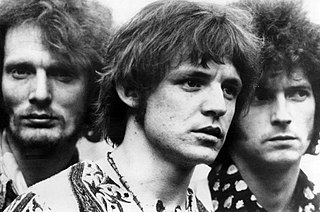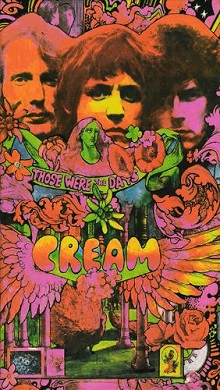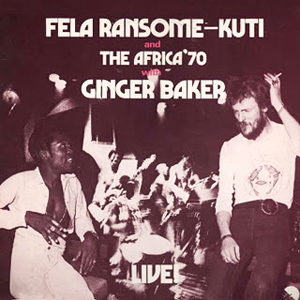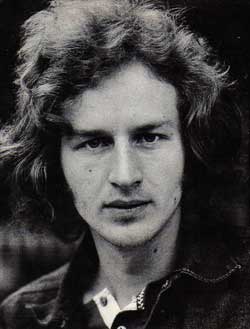Related Research Articles

A drummer is a percussionist who creates music using drums.

A supergroup is a musical group formed with members who are already successful as solo artists or as members of other successful groups. The term became popular in the late 1960s when members of already successful rock groups recorded albums together, after which they normally disbanded. Charity supergroups, in which prominent musicians perform or record together in support of a particular cause, have been common since the 1980s. The term is most common in the context of rock and pop music, but it has occasionally been applied to other musical genres. For example, opera superstars the Three Tenors have been called a supergroup.

Cream were a British rock band formed in London in 1966. The group consisted of bassist Jack Bruce, guitarist Eric Clapton and drummer Ginger Baker. Bruce was the primary songwriter and vocalist, although Clapton and Baker contributed to songs. Formed by members of previously successful bands, they are widely considered the first supergroup. Cream were highly regarded for the instrumental proficiency of each of their members.

Peter Edward "Ginger" Baker was an English drummer. His work in the 1960s and 1970s earned him the reputation of "rock's first superstar drummer", for a style that melded jazz and African rhythms and pioneered both jazz fusion and world music.

John Symon Asher Bruce was a Scottish musician. He gained popularity as the primary lead vocalist and bassist of rock band Cream. After the group disbanded in 1968, he pursued a solo career and also played with several bands.

Blind Faith were an English supergroup that consisted of Steve Winwood, Eric Clapton, Ginger Baker, and Ric Grech. They followed the success of each of the member's former bands, including Clapton and Baker's former group Cream and Winwood's former group Traffic, but they split after a few months, producing only one album and a three-month summer tour.

Fresh Cream is the debut studio album by the British rock band Cream, consisting of bassist Jack Bruce, guitarist Eric Clapton and drummer Ginger Baker. The album was released in the UK on 9 December 1966, as the first LP on the Reaction Records label, owned by producer Robert Stigwood. It was released in both mono and stereo versions, at the same time as the release of the single "I Feel Free". The album peaked at No. 6 on the UK Albums Chart. The album was released in a slightly different form in January 1967 by Atco Records in the US, also in mono and stereo versions.

Wheels of Fire is the third album by the British rock band Cream. It was released in the US in June 1968 as a two-disc vinyl LP, with one disc recorded in the studio and the other recorded live. It was released in the UK on August 9. It reached number three in the United Kingdom and number one in the United States, Canada and Australia, becoming the world's first platinum-selling double album. In May 2012, Rolling Stone magazine ranked it at number 205 on its list of the 500 greatest albums of all time. It was voted number 757 in the third edition of Colin Larkin's All Time Top 1000 Albums (2000).
Goodbye is the fourth and final studio album by Cream, with three tracks recorded live, and three recorded in the studio. It was released in Europe by Polydor Records and by Atco Records in the United States, debuting in Billboard on 15 February 1969. It reached number one in the United Kingdom and number two in the United States. A single, "Badge", was subsequently released from the album a month later. The album was released after Cream disbanded in November 1968.
"Sunshine of Your Love" is a 1967 song by the British rock band Cream. With elements of hard rock and psychedelia, it is one of Cream's best known and most popular songs. Cream bassist and vocalist Jack Bruce based it on a distinctive bass riff he developed after attending a Jimi Hendrix concert. Guitarist Eric Clapton and lyricist Pete Brown later contributed to the song and drummer Ginger Baker plays a distinctive tom-tom drum rhythm.
The Graham Bond Organisation (GBO) were a British jazz/rhythm and blues group of the mid-1960s consisting of Graham Bond, Jack Bruce (bass), Ginger Baker (drums), Dick Heckstall-Smith and John McLaughlin (guitar). They recorded several albums and further recordings were issued when the group's members achieved fame in progressive rock and jazz fusion. The spelling of the band's original name varied between releases, often depending on the intended audience. The British English spellings were "Organisation" or "ORGANisation", while in some other countries outside the UK it was spelled "Organization".

"White Room" is a song by British rock band Cream, composed by bassist Jack Bruce with lyrics by poet Pete Brown. They recorded it for the studio half of the 1968 double album Wheels of Fire. In September, a shorter US single edit was released for AM radio stations, although album-oriented FM radio stations played the full album version. The subsequent UK single release in January 1969 used the full-length album version of the track.

John Barleycorn Must Die is the fourth studio album by English rock band Traffic, released in 1970 as Island ILPS 9116 in the United Kingdom, United Artists UAS 5504 in the United States, and as Polydor 2334 013 in Canada. It marked the band's comeback after a brief disbandment, and peaked at number 5 on the Billboard Top LPs chart, making it their highest-charting album in the US, and has been certified a gold record by the RIAA. In addition, the single "Empty Pages" spent eight weeks on the Billboard Hot 100, peaking at number 74. The album was marginally less successful in the UK, reaching number 11 on the UK Albums Chart.

Live Cream is a live compilation album by the British rock band Cream, released in 1970. This album comprises four live tracks recorded in 1968 and one studio track "Lawdy Mama" from 1967. The instrumental track for "Lawdy Mama" is the same as heard on "Strange Brew" with a different vocal and guitar solo by Eric Clapton.

Those Were the Days is a retrospective compilation of music recorded by the British rock band Cream, released on 23 September 1997. It comprises four compact discs and includes almost every studio track released during the band's active lifetime, with the exception of the original "Passing The Time" from Wheels of Fire, and all but three tracks from the live material recorded in 1968 and released on Wheels of Fire, Goodbye, and the two Live Cream volumes of 1970 and 1972. The title is taken from the song written by Ginger Baker and Mike Taylor, released on Wheels of Fire in 1968.
Ginger Baker's Air Force was a jazz-rock fusion supergroup led by drummer Ginger Baker.

Ginger Baker's Air Force is the debut album by Ginger Baker's Air Force, released in 1970. This album is a recording of a sold-out live show at the Royal Albert Hall, on 15 January 1970, with the original 10-piece line up. The gatefold LP cover was designed left-handed, i.e., the front cover artwork was on what traditionally would be considered the back and vice versa.
"We're Going Wrong" is a song by British supergroup Cream from the album Disraeli Gears. The song was written by bassist Jack Bruce and was the only song on Gears that Jack wrote without lyricist Pete Brown.

Live! is a live in-studio album recorded on July 25, 1971, by Fela Kuti's band Africa '70, with the addition of former Cream drummer Ginger Baker on two songs. It was released in 1971 by EMI in Africa and Europe and by Capitol/EMI in the United States and Canada. It was reissued on CD by Celluloid in 1987 and was reissued on CD in remastered form by Barclay with a bonus track from 1978.

Richard Roman Grechko, better known as Ric Grech, was a British rock musician. He is best known for playing bass guitar and violin with the rock band Family as well as in the supergroups Blind Faith and Traffic. He also played with ex-Cream drummer Ginger Baker.
References
- ↑ Shapiro, Harry (June 2011). Jack Bruce Composing Himself: The Authorised Biography. Edition Olms. p. 70. ISBN 978-3-283-01200-7.
- ↑ Everett, Walter (1999). The Beatles as musicians: Revolver through the Anthology. Oxford University Press. p. 62. ISBN 978-0-19-512941-0 . Retrieved 11 August 2011.
- ↑ Viglione, Joe. Ginger Baker's Air Force 2 at AllMusic . Retrieved 20 September 2018.
- ↑ Pattingale, Graeme, "Fresh Cream", Those Were the Days, archived from the original on 21 July 2008, retrieved 31 July 2007.
- ↑ Milliken, Robert (1 February 2010). Mother of Rock: The Lillian Roxon Story. Black Inc. p. 262. ISBN 978-1-86395-464-8 . Retrieved 11 August 2011.
- ↑ George-Warren, Holly; Romanowski, Patricia; Pareles, Jon (30 October 2001). The Rolling Stone Encyclopedia of Rock & Roll . Fireside. p. 42. ISBN 978-0-7432-0120-9 . Retrieved 11 August 2011.
- ↑ "35 Most Memorable Moments In Rock'n'Roll Drumming". SPIN. August 1990. p. 61. ISSN 0886-3032 . Retrieved 23 December 2014.
- ↑ Budofsky, Adam (1 July 2006). The Drummer: 100 Years of Rhythmic Power and Invention. Hal Leonard. p. 62. ISBN 978-1-4234-0567-2 . Retrieved 11 August 2011.
- ↑ Saltonstall, Richard Jnr. (26 January 1968). "Rock and Jazz in a Creamy Mix". Life . p. 12. ISSN 0024-3019 . Retrieved 11 August 2011.
- 1 2 Wenner, Jann S. (20 July 1968). "Wheels of Fire". Rolling Stone . p. 20. ISSN 0035-791X.